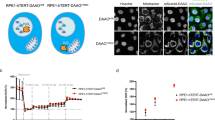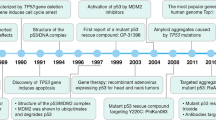Abstract
Pancreatic ductal adenocarcinoma is one of the major causes of cancer mortality in the industrialized world, having among the poorest prognosis of any malignancy. Mutations or alterations in the p53 tumor suppressor gene/protein are observed in 50–70% of these cancers, yet little information is available regarding the phenotypic effects of restoration of wild-type (wt) p53 function in pancreatic ductal carcinoma cells. The consequences of stable reintroduction of wt p53 on apoptosis and differentiation was examined in a poorly differentiated pancreatic carcinoma cell line (Panc-1), possessing only mutant (mt) p53 (codon 273 mutation). Cells were transfected with a temperature-sensitive mouse p53val135 (tsp53) vector under additional control of a genetically-modified metallothionein promoter. This tsp53 has a `mt' phenotype at 37.5°C, and a `wt' phenotype at 32.5°C and the presence of 100 μM ZnCl2. Stable expression of wt p53 caused upregulation of the p21/WAF1 gene, and G1 growth arrest as shown by flow cytometry and BrdU labeling. Additionally, apoptosis was induced 8–12 post-induction in the majority of the cells (60–70%), as demonstrated by morphological changes, in situ TdT labeling and internucleosomal laddering. However, a subpopulation (30%) of the transfectants survived this apoptotic fate. Unlike the epithelial parental Panc-1 cells, these cells exhibited the appearance of a neuroendocrine-like phenotype with extensive branch-like processes, and marked cytoplasmic and cytoskeletal immunostaining for tau-2, synaptophysin, and chromogranin A. These studies suggest that stable and regulated expression of wt p53 can have multiple phenotypic consequences (apoptosis and altered differentiation to a neuroendocrine-like phenotype) in poorly-differentiated pancreatic carcinoma cells.
This is a preview of subscription content, access via your institution
Access options
Subscribe to this journal
Receive 50 print issues and online access
$259.00 per year
only $5.18 per issue
Buy this article
- Purchase on Springer Link
- Instant access to full article PDF
Prices may be subject to local taxes which are calculated during checkout
Similar content being viewed by others
Author information
Authors and Affiliations
Rights and permissions
About this article
Cite this article
Lang, D., Miknyoczki, S., Huang, L. et al. Stable reintroduction of wild-type P53 (MTmp53ts) causes the induction of apoptosis and neuroendocrine-like differentiation in human ductal pancreatic carcinoma cells. Oncogene 16, 1593–1602 (1998). https://doi.org/10.1038/sj.onc.1201665
Received:
Revised:
Accepted:
Published:
Issue Date:
DOI: https://doi.org/10.1038/sj.onc.1201665
Keywords
This article is cited by
-
The proline TP53 variant stimulates likely lymphangiogenesis in an orthotopic mouse model of pancreatic cancer
British Journal of Cancer (2012)
-
Pancreatic cancer: from molecular pathogenesis to targeted therapy
Cancer and Metastasis Reviews (2008)
-
Staf50 is a novel p53 target gene conferring reduced clonogenic growth of leukemic U-937 cells
Oncogene (2004)
-
The p53 tumor suppressor gene is regulated in vivo by nuclear factor 1-C2 in the mouse mammary gland during pregnancy
Oncogene (2003)
-
p53 regulates ceramide formation by neutral sphingomyelinase through reactive oxygen species in human glioma cells
Oncogene (2001)



